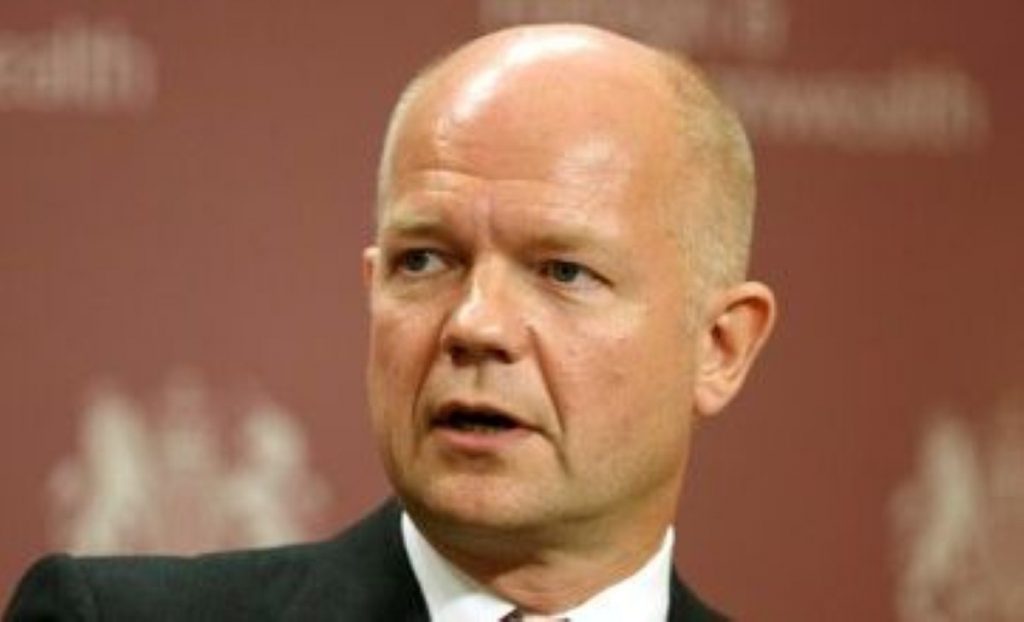Hague’s ‘head in the sand’ on torture
By Alex Stevenson Follow @alex__stevenson
William Hague has struggled to draw a line under the UK government's links with torture, as campaigners criticised plans to increase the use of secret proceedings in court.
Mr Hague defended the government's justice and security green paper in a speech on intelligence in the Foreign Office, prompting opponents to claim that centuries of civil liberties were being compromised.
The green paper outlines new proposals which the coalition claims improves the way cases involving sensitive intelligence are head in Britain's courts.
But "genuinely sensitive material" will continue to be kept secret and campaigners say would increase the use of secret proceedings in court.
"A blend of people, technology and partnerships give us an intelligence edge," Mr Hague explained in a speech at the Foreign Office this afternoon.
"If our techniques come to light, adversaries benefit and are able to switch techniques and communications resulting in a loss of knowledge about their plans.
"Many agents and sources risk their lives – some lose their lives – to give us the vital information to keep us safe. We have a duty to protect them."
Legal action charity Reprieve said the green paper would close off the legal route by which evidence of British complicity in torture first came to light, however.
"William Hague once warned that 'we cannot bury our heads in the sand' and hope allegations of torture will go away," executive director Clare Algar said.
"But sadly, this is exactly what the government is in danger of doing."
The foreign secretary conceded that claims about the UK's assistance in the shadowy process of extraordinary rendition leading to torture have undermined Britain's reputation abroad.
New Labour ministers repeatedly denied any complicity in torture, but struggled to shake off allegations that UK forces had assisted the US in the transfer of terror suspects outside US jurisdiction – where controversial interrogation techniques like waterboarding could occur.
"The very making of these allegations undermined Britain's standing in the world as a country that upholds international law and abhors torture," Mr Hague said.
"As a government we understand how important it is that we not only uphold our values and international law, but that we are seen to do so."
He said the coalition had taken steps to prevent any further claims about complicity in torture emerging.
These included the publication of "consolidated" guidance to intelligence officers on the treatment of detainees overseas and the strengthening of parliamentary scrutiny of the intelligence services.
"We are confident that taken together these changes represent the most comprehensive effort yet to address the complex issues thrown up by the need to protect our security in the 21st century, and to do so in a way that upholds our values and begins to restore public confidence," Mr Hague added.
Campaigners questioned the Gibson inquiry as being "flawed from the outset", however.
Freedom From Torture highlighted the UN's special rapporteur on torture Juan Mendez raising concerns about its lack of openness or transparency.
Chief executive Keith Best said: "Following years of government secrecy and new allegations of UK complicity in serious abuses surfacing repeatedly, most recently in Libya, how can the public be expected to trust the findings of an inquiry in which the Government reserves for itself the final say on disclosure – and where the detainees themselves are excluded from any meaningful form of participation?"
Ms Algar of Reprieve agreed, claiming the Gibson inquiry promised to be "little more than a whitewash".
"The foreign secretary must realise that the only way to restore Britain's reputation in the world is to get to the bottom of what happened, and to ensure safeguards are in place to prevent it from happening again," she added.
"Not only do his proposals fail on this count – they also threaten to roll back centuries-worth of British legal freedoms."





-01.png)